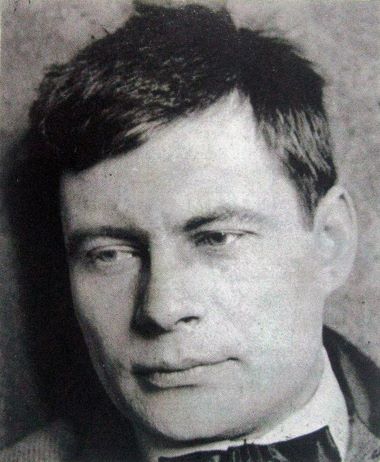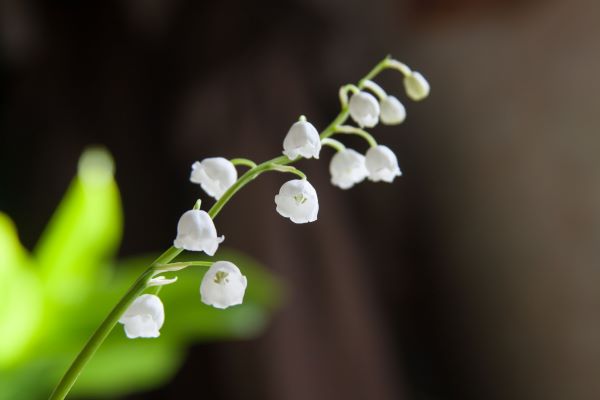Why not start Monday with poetry? I’ve selected my favorite poetry by Mike Johansen (1895-1937), a Ukrainian poet of the 1920s. Johansen described himself as an enigma–half-Ukrainian, half-Latvian German, fluent in dozens of languages and yet making Ukrainian the medium of his prose and poetry. Johansen represents the avant-garde movement of the 1920s and he was one of the brightest stars of the same group that included people like Vladimir Mayakovsky, Velimir Khlebnikov and Mykola Khvylovyi. What distinguishes his work for me is his playfulness and humor.

Although he was a gifted translator at ease with Latin, English, German, and a number of Scandinavian and Slavic languages, his poetry is impossible to translate. It relies so much on the sound of Ukrainian that in another language it becomes something else altogether. Yet, even without understanding the language, the poem is hypnotic.
The poem is called Children’s Hare, and it depicts a quiet evening, blue dusk and snow. A hunter is waiting for a hare. When the hare appears, it’s a familiar shape, the hare of children’s books and fairy tales. It dashes across valleys and fields, its shadow appearing and disappearing behind the trees. Johansen uses the repetition of the sound “za, zaia” in a deliberate manner. Hare in Ukrainian is zaiets’, zaia is its colloquial, diminutive form. By repeating “za” or “zaia” over and over again, the image of a hare becomes more tangible and I too see the hare dashing before my eyes. In a way, the poem to me is about dreams and memories.
If you would like to read along in Ukrainian, here is the original text:
Заячий вечір. Сніг.
Ах! Блакитна стеле суніч
І лягає, як стомлений синій китаєць,
З-поза сосонок
звіриних ніг,
Із забутих
дитячих книг
Знайомий з’являється
заєць.
Заяри, заялини, заячмінь
Замаячить
Заяча
Тінь.
Reading Johansen’s poems and prose is bittersweet for me. He was only 42 when he was executed on fictitious charges. Stalin’s state had no place for free thinkers, whether they were communists or not.
In one of his essays Johansen said that in the afterlife, he would be having a conversion with Heine and Cervantes about sports and literature. I imagine him doing exactly that right now.
Image: Mike Johansen, 1920s. His name is also sometimes written as Maik Yohansen.
















29 Comments
maja: This was so touching, thank you so much for sharing. And the alliteration is so clear and creates a magical thread of sounds.
Yes, who knows what and how much he would have written. Such a tragedy those times in Eastern Europe. September 14, 2020 at 7:27am
Victoria: It does, doesn’t it! In standard Ukrainian, one would write “За яри, за ялини, за ячмінь,” (but one would use a proper case, of course)–behind the valley, behind the fir trees, behind the barley [fields]. By fusing them together, Johansen makes vivid the image of a hare (заєць, заяча) running across a snow-covered landscape. September 14, 2020 at 9:49am
Tourmaline: Dear Victoria,
Thank you for this lovely post and video.
There have been too many brilliant people who died too soon. I have made a long list of them, along with the age at which they died, and no doubt there are many more. Here is my list.
Keats – 25
Anne Brontë – 29
Shelley – 29
Mozart – 35
Raphael – 37
Pushkin – 37
Van Gogh – 37
Charlotte Brontë – 38
John Lennon – 40
Jane Austen – 41
Gogol – 42
Chekhov – 44
Shakespeare 52
Beethoven – 56
Dickens – 58
Perhaps many of them gave so much when they were young that they burned out. We are fortunate to have the work they left behind.
With kind regards,
Tourmaline September 14, 2020 at 8:25am
Eudora: Thank you Victoria. I really appreciate it.
To all of you I wish you a great week! September 14, 2020 at 9:04am
Victoria: Thank you, Eudora! I’m glad that you liked it. September 14, 2020 at 9:35am
Victoria: Johansen was at the peak of his creativity when he was executed. He could have created so much more. September 14, 2020 at 9:40am
Tourmaline: Yes, that was a terrible loss. September 14, 2020 at 10:53pm
Debi Sen Gupta: Lot of singers who died in their 20s and 30s. If one believes in rebirth, maybe they have already learnt everything in their previous births. They only come back for a short while to fulfil their destinies September 14, 2020 at 4:32pm
Tourmaline: Those are comforting beliefs. September 15, 2020 at 3:16am
Tourmaline: To paraphrase the words of Hugh Grant’s character in “Four Weddings and a Funeral”, reading the list of people who achieved such a lot so quickly makes me wonder what I’ve been doing with my time. September 15, 2020 at 3:14am
maja: Something Tsvetaeva would write in Russian, too, maybe, these little word games and sounds and invented combinations. 🙂
Lovely poem, I can see the hare jumping. September 14, 2020 at 10:47am
Victoria: Definitely!
Here is one example:
В ворохах сонного пуха:
Водопад, пены холмы —
Новизной, странной для слуха,
Вместо: я — тронное: мы…
And here is an English translation of another one of her poems, which captures some of the original’s rhythm.
How is your life with that other one?
Simpler, is it? A stroke of the oars
and a long coastline—
and the memory of me
is soon a drifting island
(not in the ocean—in the sky!)
Souls—you will be sisters—
sisters, not lovers.
How is your life with an ordinary
woman? without the god inside her?
The queen supplanted—
“An Attempt at Jealousy” September 14, 2020 at 12:45pm
maja: That’s the one I was thinking about. My favorite! What a masterpiece! *heart* September 14, 2020 at 1:02pm
Victoria: My favorite by Tsvetaeva is the Poem of the End. September 15, 2020 at 6:03am
AndreaR: Thank you for introducing Mike Johansen. I had no idea. September 14, 2020 at 1:52pm
Victoria: His most famous work is a novel titled The Adventures of Doctor Leonardo, or Doctor Leonardo’s Travels through the Switzerland of Slobidska Ukraine (‘Podorozh doktora Leonardo po Slobozhans’kii Shvaitsariï’) September 15, 2020 at 6:04am
Fazal: This is an interesting read that ends on a sad note. Life is so unpredictable and so unfair to otherwise many brilliant minds. You know, I don’t fear death in a conventional sense; I just feel depressed that death deprives us of so many wonderful experiences we would continue to have by keep on living. In other words, it is a fear of missing the so many unknowns. September 14, 2020 at 2:22pm
Victoria: I know what you mean. It’s not the fear of the unknown or the end, but rather the fear of not discovering something beautiful that’s worth discovering. The fear of not satisfying one’s hunger for life enough. September 15, 2020 at 6:08am
Michele Davis: I love the eclectic range of poets you explore and share. Thank you. September 14, 2020 at 8:18pm
Victoria: I’m very happy to share! Thank you for reading. September 15, 2020 at 6:08am
Bregje: This is the first time that i wished i could read and understand Ukranian.
The poem sounds beautiful. September 14, 2020 at 8:37pm
Victoria: Ukrainian is a mellifluous language because of its inherent characteristics. It coats all of the consonants with vowels, and it’s perfectly acceptable to changes vowels in words depending on what other words come before or after. So this fluidity lends itself to poetry and song. September 15, 2020 at 6:10am
Peter: Mahalo Victoria for your heartfelt presentation of your ‘friend’ Johansen’s poetry. Great art transcends death. September 14, 2020 at 8:50pm
Victoria: Thank you, Peter! September 15, 2020 at 6:10am
Virlana Tkacz: Victoria – we’ve done translations of Iohansen – but not this poem – get in touch if you are interested – September 16, 2020 at 11:05am
Victoria: Thank you very much. If you could share any resources with my readers, it would be great. September 17, 2020 at 5:43am
Aurora: Victoria, thank you so much, I didn’t know this poet at all. And he wrote prose too. What a tragic life. September 20, 2020 at 5:38am
Victoria: Indeed, that whole generation suffered a lot. But while they created, they wrote many wonderful things. September 21, 2020 at 4:58am
Oleksii CHYSTIAKOV: Beautiful November 16, 2023 at 3:07am